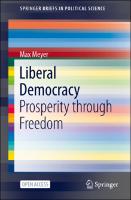Liberal Democracy
Prosperity through Freedom
| dc.contributor.author | Meyer, Max | |
| dc.date.accessioned | 2020-08-13T11:53:48Z | |
| dc.date.available | 2020-08-13T11:53:48Z | |
| dc.date.issued | 2020 | |
| dc.identifier | ONIX_20200813_9783030474089_27 | |
| dc.identifier | OCN: 1182515381 | |
| dc.identifier.uri | https://library.oapen.org/handle/20.500.12657/41285 | |
| dc.description.abstract | This open access book aims to show which factors have been decisive in the rise of successful countries. Never before have so many people been so well off. However, prosperity is not a law of nature; it has to be worked for. A liberal economy stands at the forefront of this success – not as a political system, but as a set of economic rules promoting competition, which in turn leads to innovation, research and enormous productivity. Sustainable prosperity is built on a foundation of freedom, equal opportunity and a functioning government. This requires a stable democracy that cannot be defeated by an autocrat. Autocrats claim that “illiberalism” is more efficient, an assertion that justifies their own power. Although autocrats can efficiently guide the first steps out of poverty, once a certain level of prosperity has been achieved, people begin to demand a sense of well-being – freedom and codetermination. Only when this is possible will they feel comfortable, and progress will continue. Respect for human rights is crucial. The rules of the free market do not lean to either the right or left politically. Liberalism and the welfare state are not mutually exclusive. The “conflict” concerns the amount of government intervention. Should there be more or less? As a lawyer, entrepreneur, and board member with over 40 years of experience in this field of conflict, the author clearly describes the conditions necessary for a country to maintain its position at the top. | |
| dc.language | English | |
| dc.relation.ispartofseries | SpringerBriefs in Political Science | |
| dc.subject.classification | thema EDItEUR::J Society and Social Sciences::JP Politics and government::JPB Comparative politics | en_US |
| dc.subject.classification | thema EDItEUR::J Society and Social Sciences::JP Politics and government::JPA Political science and theory | en_US |
| dc.subject.classification | thema EDItEUR::K Economics, Finance, Business and Management::KC Economics::KCL International economics | en_US |
| dc.subject.classification | thema EDItEUR::J Society and Social Sciences::JP Politics and government::JPH Political structure and processes | en_US |
| dc.subject.other | Comparative Politics | |
| dc.subject.other | Political Theory | |
| dc.subject.other | International Economics | |
| dc.subject.other | Governance and Government | |
| dc.subject.other | Liberalism | |
| dc.subject.other | Equal opportunity | |
| dc.subject.other | Stable democracy | |
| dc.subject.other | Freedom | |
| dc.subject.other | Free market | |
| dc.subject.other | Government intervention | |
| dc.subject.other | Liberal Economy | |
| dc.subject.other | Illiberalism | |
| dc.subject.other | Human rights | |
| dc.subject.other | Autocracy | |
| dc.subject.other | Poverty | |
| dc.subject.other | Prosperity | |
| dc.subject.other | Productivity | |
| dc.subject.other | Innovation | |
| dc.subject.other | Welfare state | |
| dc.subject.other | European Union | |
| dc.subject.other | Switzerland | |
| dc.subject.other | Immigration | |
| dc.subject.other | Integration | |
| dc.subject.other | Open access | |
| dc.subject.other | Comparative politics | |
| dc.subject.other | Political science & theory | |
| dc.subject.other | International economics | |
| dc.subject.other | Political structure & processes | |
| dc.title | Liberal Democracy | |
| dc.title.alternative | Prosperity through Freedom | |
| dc.type | book | |
| oapen.identifier.doi | 10.1007/978-3-030-47408-9 | |
| oapen.relation.isPublishedBy | 6c6992af-b843-4f46-859c-f6e9998e40d5 | |
| oapen.imprint | Springer | |
| oapen.pages | 74 |

